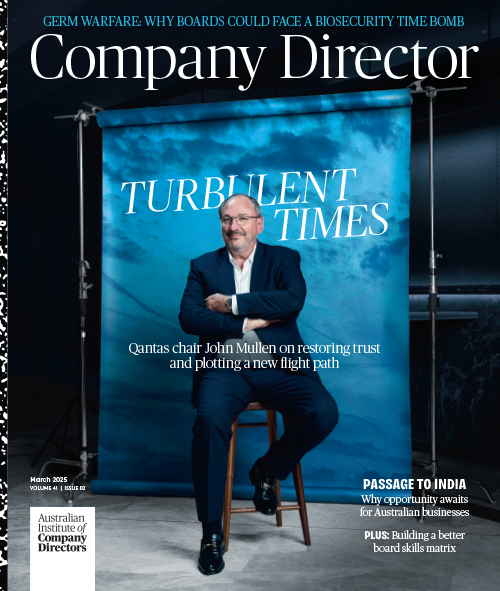There are too few women in chair roles, according to the AICD’s latest Gender Diversity Progress Report.
Women account for around 10 per cent of all ASX 200 and ASX 300 chair roles, according to a recent AICD report, at odds with the 39 per cent of women currently chairing ASX 300 committees. The proportion of women ASX 200 chairs increased from 7.5 to 10.5 per cent (six chair roles) between 2019–22. Over the same period, the women chairing ASX 300 companies increased from 6.3 to 11 per cent (15 chair roles).
“This lack of growth is stark — in contrast to the impressive increase in gender balance at director level,” says AICD CEO and managing director Mark Rigotti MAICD. The report found that women account for 35.7 per cent of ASX 200 directorships and 34.9 per cent of ASX 300 directorships. “It should follow that an expanded talent pool and improved gender diversity on boards translates to an increased number of women chairs,” says Rigotti. “However, our analysis indicates that is not coming through proportionally.”
Big issues for business leaders
KPMG research reveals the main things on the minds of Australian business leaders this year.
77%
Talent acquisition retention and re/upskilling to meet a more digitised future
46%
Digital transformation/ optimisation — and extracting organisational value from it
40%
Dealing with cyber risks
35%
Dealing with evolving regulatory processes, reporting changes and impacts
35%
The need for greater agility and flexibility in organisation to meet opportunities and challenges
33%
Identifying and growing future market segments and/or innovation opportunities for growth
30%
Balancing short-term versus long-term value creation in organisation
26%
Challenges and benefits of employees working remotely
25%
Designing and implementing an ESG strategy to deliver benefits in short and long term
22%
Genuinely embedding innovation into organisational culture and practice
Nicola Wakefield Evans FAICD labels it a “shocking lack of progress [which] points to the entrenched, systemic drivers of gender inequality that exist in Australia’s workplaces, including a persistent gender pay gap and the dominance of men in the leadership pipeline”. The 30% Club Australia chair and Lendlease non-executive director notes that the challenges are not unique to Australia, pointing to the UK, where there are almost 40 per cent women on top boards, but “too few women in chair roles and only 10 women CEOs in the FTSE 100”.
Working capital deteriorates
McGrathNicol has launched the 10th edition of its Working Capital Report, which recorded the largest deterioration in working capital performance over the past 10 years. The report, which surveyed 139 ASX-listed companies across seven capital-intensive sectors (with a combined market capitalisation of $1 trillion) found that average working capital cycles lengthened by 5.3 days in 2022. This led to an additional $11.1b being locked up in working capital for Australian companies, more than double the amount in 2021 ($5.5b).
Latest news
Already a member?
Login to view this content


